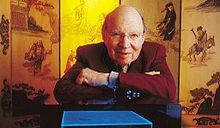Juval Ne'eman
Juval Ne'eman ( Hebrew יובל נאמן; born on May 14, 1925 in Tel Aviv ; died on April 26, 2006 ibid) was an Israeli physicist and politician .

Military and political career
Ne'eman joined the Hagana at the age of 15 and served in the 1948 War of Independence as battalion commander , "Operations Officer" for Tel Aviv and commander of the Giv'ati Brigade . From 1952 to 1954 he was "Deputy Commander" in the General Staff and, as captain, head of the planning department of the Israeli army . He organized the Israeli Army's mobilization and reservist system and wrote the first draft of its Defense Doctrine. From 1955 as deputy director, from 1956 to 1957 as director of the army intelligence service, he was a. a. involved in negotiations with the British and French in the Suez crisis . He was then from 1958 to 1960 attaché to the Ministry of Defense in London before he was released into the reserve. Most recently he had the rank of colonel .
He then pursued a scientific career. From 1965 to 1984 he was active in the Israeli Atomic Energy Commission and scientific director of its Soreq Nuclear Research Center , which serves civil research. From 1974 to 1976 he was chief scientist at the Israeli Defense Ministry.
From 1982 to 1992 he was a member of the Knesset for the right-wing Techija party, which he founded in 1979 as a splinter group of the Likud in protest against Menachem Begin's Camp David negotiations with Egypt . In 1981 the party won three seats in the Knesset. While his party was involved in the Likud bloc of Menachem Begin, he was Minister of Science from 1982 to 1983, and he also held this position from 1990 to 1992. From 1988 to 1992 he was also Minister for Energy and Infrastructure. After his party was excluded from coalitions twice in the 1980s, he gave up his seat in the Knesset in 1990. After serving as minister, he finally gave up his political career in 1992.
In 1983 he founded the Israel Space Agency and was its chairman until 2005.
Career as a physicist
Ne'eman graduated from high school at the age of 15 and studied mechanical engineering at the Technion in Haifa , where he graduated after two years in 1945, although he had to interrupt his studies several times. He studied further in Paris (at the Military Academy) and in London at Imperial College in the late 1950s , where he obtained a degree in physics. During his time as attaché in London, he did his doctorate there in 1960/61 under Abdus Salam with a thesis in which he proposed a classification of hadrons by SU (3) symmetry independently of Murray Gell-Mann . This was a precursor to the current Quark model . In the 1980s he was a. a. with the group-theoretical structure of string theory and with gravitation theory .
He was the founder and from 1965 to 1972 director of the physics department of Tel Aviv University (TAU). From 1971 to 1975 he was president of the TAU and from 1979 to 1997 director of the local "Sackler Institute for Advanced Study". He was director of the Center for Particle Theory at the University of Texas at Austin from 1968 to 1990.
In 1969 he received the Israel Prize and the Albert Einstein Award and in 2003 the EMET Prize. In 1970 he was elected to the American Academy of Arts and Sciences , in 1971 he became a Fellow of the American Physical Society , and in 1972 of the National Academy of Sciences .
He was married and had two children. He died of a stroke in 2006.
literature
- with Yoram Kirsh: The Particle Hunters . Springer, Berlin 1995.
- From the quarks to the cosmos. 70 years of physics in Israel .
- Matter particled: patterns, structure and dynamics. Selected research papers of Yuval Neeman . Imperial College Press 2006.
- Nuclear Physics , Vol. 26, 1961, p. 222. (on the Quark model)
- with L. Corwin and Shlomo Sternberg : Graded Lie algebras in mathematics and physics , Review of Modern Physics, Vol. 47, 1975, pp. 573-603.
- The spectrum generating group program and the string . Foundations of Physics, Vol. 19, 1988, p. 245.
- Quantum gravity and supergravity . In: Harry Woolf (ed.): Some Strangeness in proportion. A centennial symposium to celebrate the achievements of Albert Einstein . Addison-Wesley 1980.
Web links
- Publications in the INSPIRE-HEP database
- Info from the Knesset website
- Haaretz obituary
- Streater's memories of his studies in London ( Memento from May 12, 2009 in the Internet Archive )
| personal data | |
|---|---|
| SURNAME | Ne'eman, Juval |
| ALTERNATIVE NAMES | Ne'eman, Yuval |
| BRIEF DESCRIPTION | Israeli physicist and politician |
| DATE OF BIRTH | May 14, 1925 |
| PLACE OF BIRTH | Tel Aviv |
| DATE OF DEATH | April 26, 2006 |
| Place of death | Tel Aviv |
